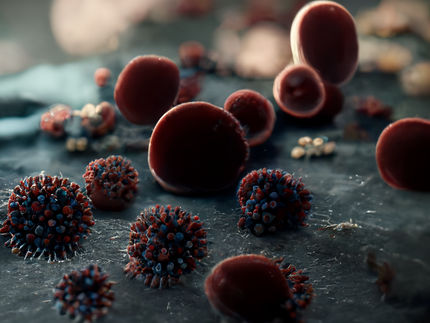Why the flu vaccine is less effective in older people
Study identifies key molecules and possible approaches to improve the vaccination response
Advertisement
So-called high-dose flu vaccines are available for older people. The reason: their immune system does not always respond sufficiently well to the standard flu vaccines. Why this is the case and the molecular processes behind it are not yet understood. However, in their current research work, scientists from the Centre for Individualised Infection Medicine (CiiM), a joint initiative of the Helmholtz Centre for Infection Research (HZI) and Hannover Medical School (MHH), using a cohort study with around 230 participants over the age of 65, have now been able to identify key molecules. The researchers hope that their findings will help to further increase the immune response to the flu vaccine in older people in the future. The study has been published in the journal “Science Advances”.
Every year at the beginning of October, the flu epidemic rolls around. “Because older people in particular have an increased risk of a severe course of the disease, effective vaccines are especially important for them,” says Prof. Yang Li, Scientific Director of the CiiM and head of the ‘Bioinformatics of Individualized Medicine’ department at the HZI. There are so-called high-dose flu vaccines for people aged 60 or 65 and over, as the standard flu vaccines do not work sufficiently well for them. But what is the reason? “With age, the immune system is no longer able to build up a sufficient immune response,” explains Li. “With our study, we wanted to find out exactly what this is connected to, which molecular processes play a role here - and identify approaches that could be used to improve the immune response.”
The study was based on a cohort of 234 participants over the age of 65 who were vaccinated against influenza. Blood was taken from them at a total of five different times - before and after the vaccination. This was examined in detail using the latest molecular biology methods, which are summarized under the term “multi-omics”. The researchers analyzed the huge amounts of data generated using statistical and computational models. In doing so, they investigated how the immune response differs between those who respond well to the vaccination (responders) and those do not (non-responders). “We were able to identify a number of important molecules that correlated with the good immune response of responders after vaccination. In the non-responders, however, these signature molecules were reduced or not detected at all,” explains Dr. Saumya Kumar, scientist in Yang Li's research group at CiiM and first author of the study. “And unlike the responders, the non-responders showed an increased number of certain activated immune cells in the blood, so-called Natural Killer cells. The differences that we were able to identify between responders and non-responders at various levels of omics layers were indeed very clear.”
In their study, the scientists also investigated whether it is possible to predict how good the immune response will be before the vaccination. “To do this, we looked at the blood samples that were taken before the vaccination. The later non-responders showed elevated levels of interleukin-15 before vaccination. High levels of this messenger molecule can be an indication of developing chronic inflammatory processes in older people,” says Li. In subsequent studies in the mouse model, the researchers were able to show that mice that lacked the receptors for the messenger molecule exhibited an improved response to immunization. “Interleukin-15 appears to be responsible for the lack of sufficient immune response and could therefore be a good predictive biomarker,” says Li. “It would also be conceivable to reduce elevated levels of interleukin-15 before vaccination by administering suitable active substances in order to improve the immune response. However, such an approach is still a long way off.”
The scientists also revealed another interesting approach in their study: The non-responders had significantly lower concentrations of long-chain fatty acids in their blood before vaccination than responders. “Older people often suffer from concomitant diseases that are associated with chronic inflammatory processes. Certain long-chain fatty acids have an anti-inflammatory effect and support the development of a good immune response overall,” says Kumar. “An adequate supply of such long-chain fatty acids, such as those found in fish oil or healthy nuts, could be an effective way to improve the immune response to flu vaccinations as well as general health. Whether and how well this works still needs to be researched.”
“With our study, which for the first time included such a large cohort of participants from the over-65 age group, we were able to provide important insights into the formation of the vaccination response after a flu vaccination in older people,” says Li. “We were able to identify key molecules for good and bad immune responses, which can be used for further research. We hope that our research results can help to further increase the immune response of flu vaccinations in older people in the future.”
The study was conducted in cooperation with MHH and TWINCORE, Centre for Experimental and Clinical Infection Research, a joint venture of HZI and MHH, and the University of Lisbon, Portugal. The research work was funded by the ERC Starting Grant ModVaccine (948207), which was awarded to Yang Li
Original publication
Saumya Kumar, Martijn Zoodsma, Nhan Nguyen, Rodrigo Pedroso, Stephanie Trittel, Peggy Riese, Javier Botey-Bataller, Liang Zhou, Ahmed Alaswad, Haroon Arshad, Mihai G. Netea, Cheng-Jian Xu, Frank Pessler, Carlos A. Guzmán, Luis Graca, Yang Li; "Systemic dysregulation and molecular insights into poor influenza vaccine response in the aging population"; Science Advances, Volume 10



















































